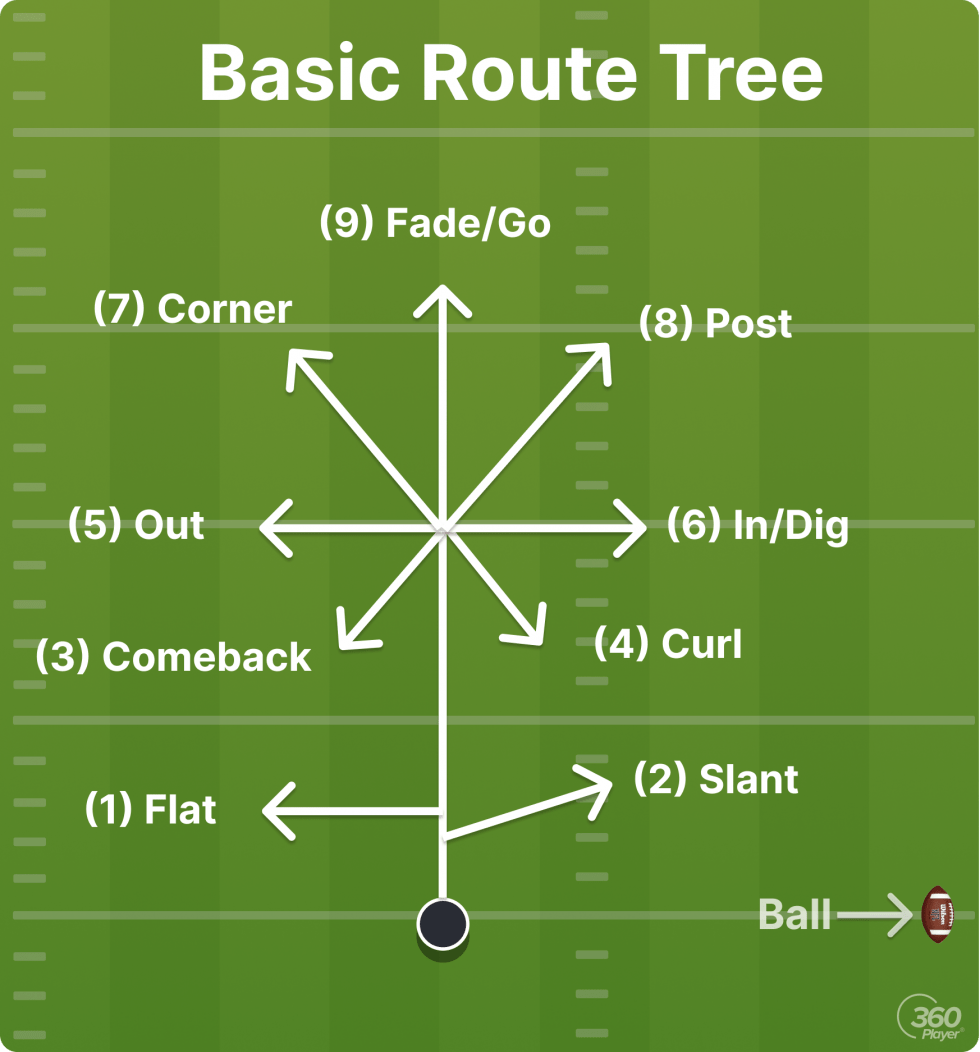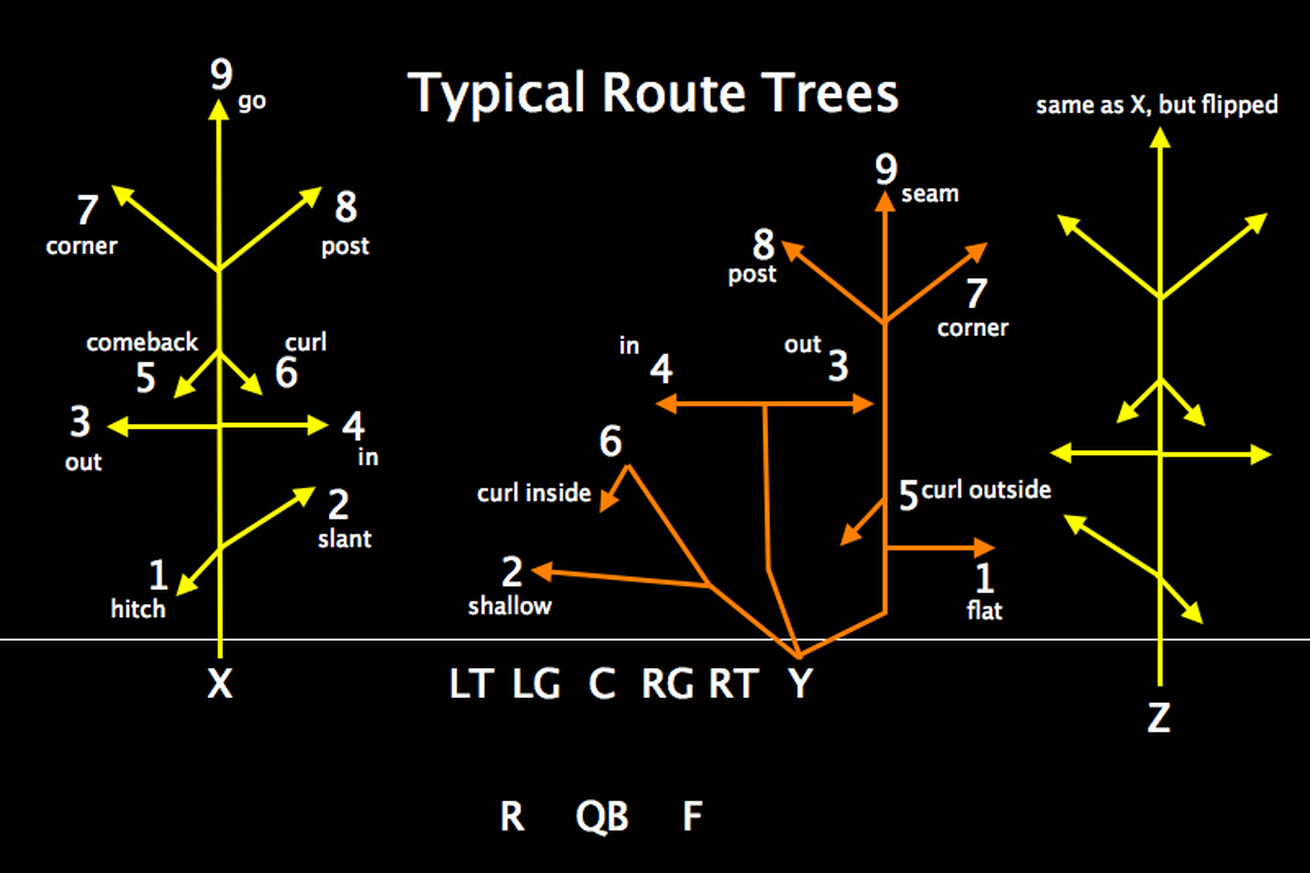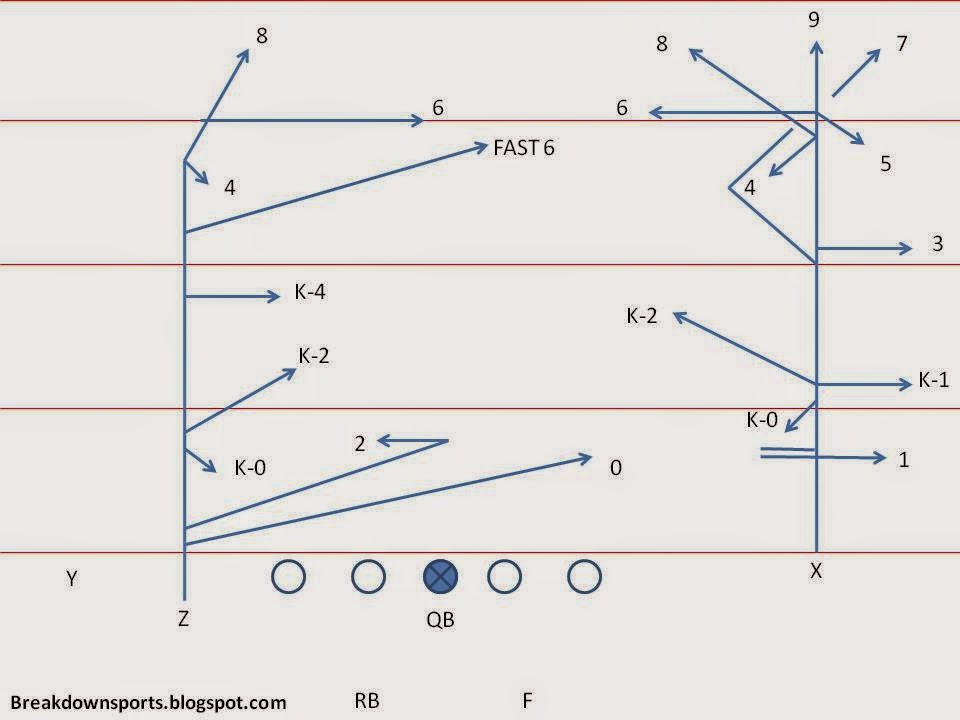Printable Football Route Tree
Printable Football Route Tree - Below, i’ve listed each of them in order of shortest to longest depth. Web a route tree is a diagram representation of the different routes players run on the field. They are patterns run by receivers to create openings for the quarterbacks. Web the route tree or passing tree is a number system used for the passing routes common in the nfl, ncaa and high school levels. Although there are many different routes receivers can run, the route tree includes some of the most common ones so that they can be. Web having a good understanding of each of the nine football routes, how they’re run, and the situations in which they’re most often used is very important. Web routes are patterns that receivers run on each play to get open for the quarterback. The football route tree is one of the oldest ways for coaches to organize pass game routes in their offense, and create an easy way to teach players all the basic routes they'll need to know to be able to run pass. The football passing route tree is a numbering system used by offensive players and coaches to identify which directions and patterns the wide receivers are going to run on passing plays. Web the football route tree. Web for example, a wheel route (which is an out and then a streak up the sideline) would be called a 19. The nine basic routes are the flat (1), slant (2), comeback (3), curl (4), out (5), dig (6), corner (7), post (8), and fade (9). Web the football route tree. Web the route tree or passing tree is. Web football univeristy running backs route tree 00000. The football route tree is one of the oldest ways for coaches to organize pass game routes in their offense, and create an easy way to teach players all the basic routes they'll need to know to be able to run pass. Web a route tree is a diagram representation of the. Although there are many different routes receivers can run, the route tree includes some of the most common ones so that they can be. Below, i’ve listed each of them in order of shortest to longest depth. The nine basic routes are the flat (1), slant (2), comeback (3), curl (4), out (5), dig (6), corner (7), post (8), and. Below, i’ve listed each of them in order of shortest to longest depth. The football route tree is one of the oldest ways for coaches to organize pass game routes in their offense, and create an easy way to teach players all the basic routes they'll need to know to be able to run pass. Although there are many different. Web a route tree is a diagram representation of the different routes players run on the field. They are patterns run by receivers to create openings for the quarterbacks. Web the football route tree. Web routes are patterns that receivers run on each play to get open for the quarterback. Web having a good understanding of each of the nine. You can download and print for your whole team to use. Web football univeristy running backs route tree 00000. Below, i’ve listed each of them in order of shortest to longest depth. Web a football route tree consists of a single straight line with other lines branching off it, depicting the various possible routes. The football passing route tree is. Here is what a basic football route tree looks like. Although there are many different routes receivers can run, the route tree includes some of the most common ones so that they can be. Below, i’ve listed each of them in order of shortest to longest depth. The nine basic routes are the flat (1), slant (2), comeback (3), curl. Each route has its own path and timing is key to getting open and catching the ball. Web football univeristy running backs route tree 00000. Web routes are patterns that receivers run on each play to get open for the quarterback. The football route tree is one of the oldest ways for coaches to organize pass game routes in their. Although there are many different routes receivers can run, the route tree includes some of the most common ones so that they can be. Below, i’ve listed each of them in order of shortest to longest depth. The football passing route tree is a numbering system used by offensive players and coaches to identify which directions and patterns the wide. Web football univeristy running backs route tree 00000. Web football coaching resources one of the most often used routes in the game, the out route is executed via a forward run of more than 5 and less than 10 yards, followed by a sharp 90° cut to the sideline. They are patterns run by receivers to create openings for the. Web routes are patterns that receivers run on each play to get open for the quarterback. Web the route tree or passing tree is a number system used for the passing routes common in the nfl, ncaa and high school levels. Web for example, a wheel route (which is an out and then a streak up the sideline) would be called a 19. Web the football route tree. They are patterns run by receivers to create openings for the quarterbacks. Below, i’ve listed each of them in order of shortest to longest depth. Although there are many different routes receivers can run, the route tree includes some of the most common ones so that they can be. The nine basic routes are the flat (1), slant (2), comeback (3), curl (4), out (5), dig (6), corner (7), post (8), and fade (9). The football route tree is one of the oldest ways for coaches to organize pass game routes in their offense, and create an easy way to teach players all the basic routes they'll need to know to be able to run pass. There are nine basic routes, with each route featuring a path and an opening. Each route has its own path and timing is key to getting open and catching the ball. If you've ever opened a playbook before, you've probably seen something that looks like the picture below. Web having a good understanding of each of the nine football routes, how they’re run, and the situations in which they’re most often used is very important. The football passing route tree is a numbering system used by offensive players and coaches to identify which directions and patterns the wide receivers are going to run on passing plays. Web a route tree is a diagram representation of the different routes players run on the field. Here is what a basic football route tree looks like. Web football univeristy running backs route tree 00000. You can download and print for your whole team to use. Web a football route tree consists of a single straight line with other lines branching off it, depicting the various possible routes. Web football coaching resources one of the most often used routes in the game, the out route is executed via a forward run of more than 5 and less than 10 yards, followed by a sharp 90° cut to the sideline. The football route tree is one of the oldest ways for coaches to organize pass game routes in their offense, and create an easy way to teach players all the basic routes they'll need to know to be able to run pass. Web the football route tree. Each route has its own path and timing is key to getting open and catching the ball. Web for example, a wheel route (which is an out and then a streak up the sideline) would be called a 19. Web the route tree or passing tree is a number system used for the passing routes common in the nfl, ncaa and high school levels. The nine basic routes are the flat (1), slant (2), comeback (3), curl (4), out (5), dig (6), corner (7), post (8), and fade (9). If you've ever opened a playbook before, you've probably seen something that looks like the picture below. Web routes are patterns that receivers run on each play to get open for the quarterback. Web football univeristy running backs route tree 00000. Here is what a basic football route tree looks like. Although there are many different routes receivers can run, the route tree includes some of the most common ones so that they can be. There are nine basic routes, with each route featuring a path and an opening. Below, i’ve listed each of them in order of shortest to longest depth. They are patterns run by receivers to create openings for the quarterbacks. You can download and print for your whole team to use. Web a football route tree consists of a single straight line with other lines branching off it, depicting the various possible routes.Football 101 Breaking Down The Basics of The Route Tree 360Player
Printable Football Route Tree Printable Word Searches
All 9 Football Routes Explained with Images (The Route Tree)
2014 NFL Draft Davante Adams Film Study Big Blue View
The San Diego Chargers Offensive Makeover From Turner to McCoy Bolts
Printable Football Route Tree Printable Word Searches
Printable Football Route Tree Printable Word Searches
Football Fundamentals Route Tree
All Football Routes Explained [Tree & Graphs 2022 Updated]
Wide Receiver Routes Patterns Football Times
The Football Passing Route Tree Is A Numbering System Used By Offensive Players And Coaches To Identify Which Directions And Patterns The Wide Receivers Are Going To Run On Passing Plays.
Web A Route Tree Is A Diagram Representation Of The Different Routes Players Run On The Field.
Web Having A Good Understanding Of Each Of The Nine Football Routes, How They’re Run, And The Situations In Which They’re Most Often Used Is Very Important.
Web Football Coaching Resources One Of The Most Often Used Routes In The Game, The Out Route Is Executed Via A Forward Run Of More Than 5 And Less Than 10 Yards, Followed By A Sharp 90° Cut To The Sideline.
Related Post:









![All Football Routes Explained [Tree & Graphs 2022 Updated]](https://thechamplair.com/wp-content/uploads/2021/01/Football-Routes-tree-768x783.jpg)
